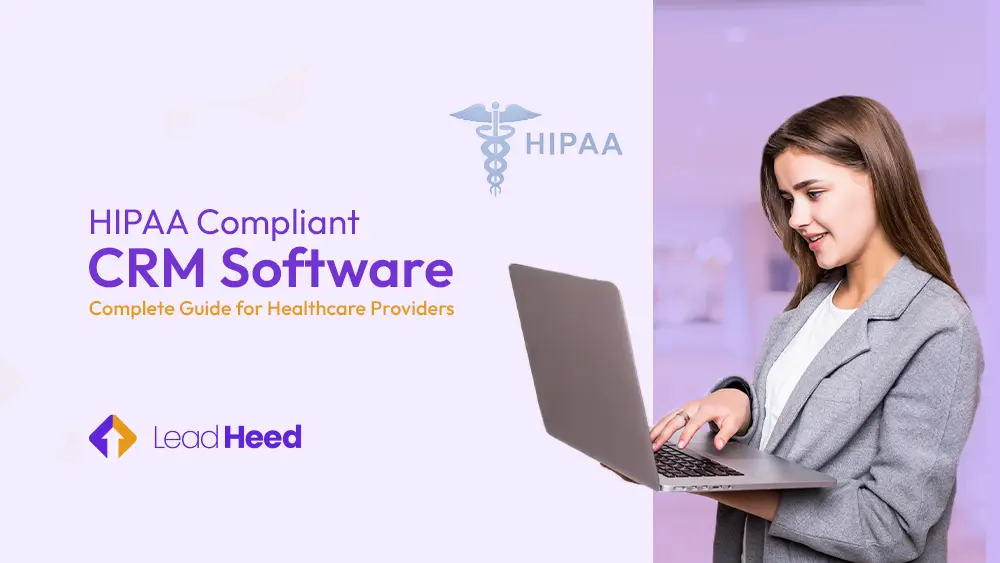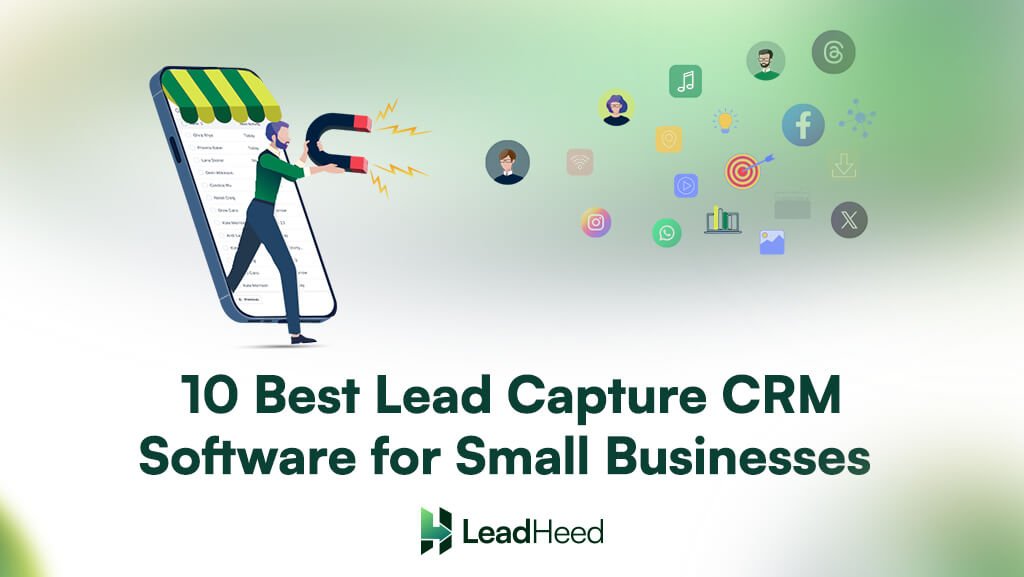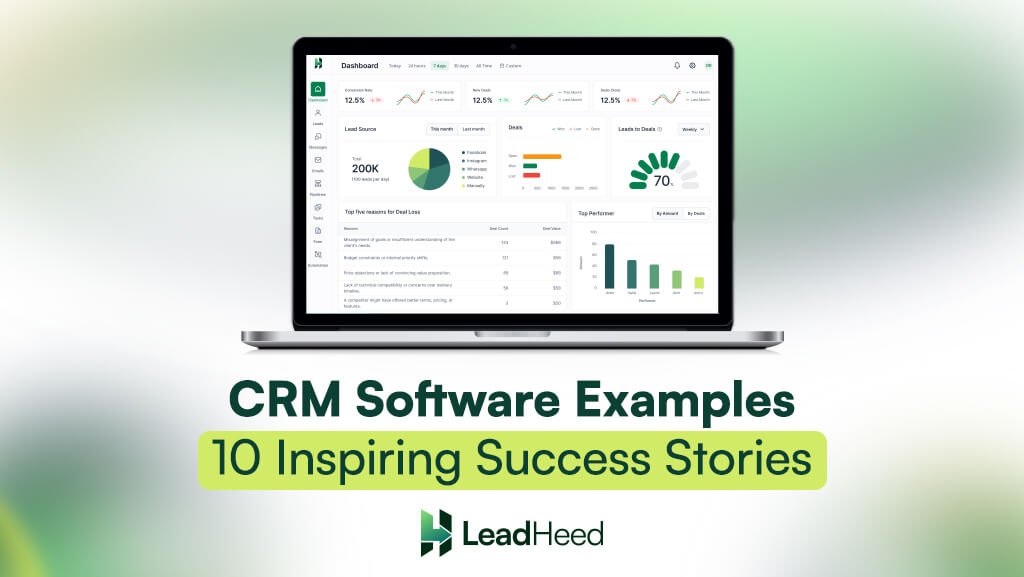Patient trust is the backbone of quality healthcare. But without HIPAA-compliant CRM software, private information can be exposed, leading to data breaches, fines, and legal problems. With data moving faster than ever, keeping patient information safe isn’t optional, but mandatory.
HIPAA-compliant CRMs solve this by keeping data secure, meeting legal standards, and making it easier to manage patient relationships. In this guide, you’ll learn what they are, why they matter, and how to find the best one for your needs
What is HIPAA-Compliant, and its Impact on the CRM system?
HIPAA stands for Health Insurance Portability and Accountability Act compliance, which means following rules that protect patient health information (PHI). Healthcare providers using a HIPAA CRM software can safely manage records, appointments, and treatment details.
This healthcare CRM software uses encryption, secure logins, and access controls to protect records, appointments, and treatment notes. It also makes daily tasks easier, so staff can share information safely. By keeping data safe and improving workflows, HIPAA-compliant CRM software helps healthcare teams focus on patient care instead of compliance issues.
What Makes CRM Software HIPAA Compliant?
CRM software is considered HIPAA-compliant when it protects patient data, allows only authorized staff to access sensitive information, and maintains full accountability through detailed activity tracking. For healthcare providers, this ensures patient records, appointment schedules, and treatment plans are managed securely without risking data breaches or regulatory violations.
Key features that make a CRM HIPAA-compliant include:
- Data encryption: Protects sensitive patient information from unauthorized access, both while stored and during transmission.
- Role-based access & user authentication: Ensures only authorized personnel can access or modify patient data, reducing the risk of accidental or malicious breaches.
- Audit trails & activity logging: Records all user actions, providing accountability and traceability for compliance audits.
- Secure messaging & communication channels: Safeguards emails, chats, and notifications between staff and patients, keeping communication private.
- Data backup & disaster recovery: Ensures patient information is preserved and recoverable in case of hardware failure, cyberattacks, or other emergencies.
- HIPAA-ready documentation & reporting: Simplifies compliance by generating reports and documentation required for audits and regulatory reviews.
What are the Benefits of Implementing HIPAA-Compliant CRM Software?
Using a HIPAA-compliant CRM system improves workflow efficiency, strengthens trust, and reduces legal risks. It keeps sensitive data safe and also improves workflows, communication, and overall patient care.
- Protects patient data and builds trust: Encryption and secure access keep health records safe. This builds patient confidence and loyalty.
- Reduces legal risks: Following HIPAA rules help avoid fines and legal problems.
- Streamlines secure communication: Staff can safely share records, updates, and messages without risking data leaks.
- Improves workflow efficiency: Automating tasks frees up time for patient care while ensuring compliance.
|
Protect your practice and elevate patient care. |
How to Choose the Best HIPAA-compliant CRM?
Selecting the right HIPAA-compliant customer relationship management system ensures your practice stays secure and efficient. Focus on security, ease of use, and integration with your existing healthcare systems to make the best choice.
1. Check security and compliance
Make sure the CRM meets HIPAA standards. Look for features like encryption, secure logins, and audit trails that track all user activity. Additionally, certifications show the vendor is serious about CRM data security.
2. Look for healthcare integration
The CRM should connect with EHR (Electronic Health Record) systems, billing software, and other medical tools. These CRM integrations reduce manual data entry, minimize errors, and keep patient records consistent across your practice.
3. Focus on ease of use
An intuitive design and customizable workflows help your team adapt quickly while staying compliant. Additionally, training should be provided to enable your team to get up to speed quickly.
4. Plan for growth
Choose a CRM that can handle more users, records, and features as your practice expands. Scalability ensures your CRM continues to support your practice without requiring frequent migrations or replacements.
5. Test customer support
Pick a vendor with fast, helpful support via chat, email, or phone. Strong support helps resolve technical issues quickly and gives your team the confidence to use the system effectively.
Top 15 Best HIPAA-Compliant CRM Software
Choosing the right CRM is essential in healthcare, where data security and compliance are non-negotiable. HIPAA-compliant CRM software protects sensitive patient information and also improves workflows, patient engagement, and overall care delivery.
Below, we’ve listed the top 15 HIPAA-compliant CRM solutions, each with unique features, pros, and cons to help you find the right fit for your practice.
1. LeadHeed
LeadHeed is a modern medical CRM software designed for HIPAA compliance. It centralizes patient records, automates reminders, and secures communication. LeadHeed encrypts data and controls access. This keeps patient interactions secure and efficient, making it ideal for practices that need secure, compliant workflows.
Features:
- AI-driven appointment and follow-up automation
- Encrypted patient data storage
- Omnichannel secure messaging
- Role-based access control for staff
- Integrated telehealth and video consultations
- Patient self-service portal for scheduling and records
- Customizable dashboards for different departments
Pros:
- Easy to use for small and large teams
- Strong EHR integration options
- Automated compliance reports
Cons:
- Limited third-party app marketplace
- Higher cost for advanced AI features
2. Salesforce Health Cloud
Salesforce Health Cloud is enterprise-level HIPAA-compliant software for healthcare that unifies patient data from multiple sources. It provides secure analytics, segmentation, and engagement tools to improve care delivery while protecting sensitive patient information.
This healthcare CRM software is ideal for large organizations requiring customizable workflows and robust compliance management.
Features:
- Encrypted data sharing between care teams
- Advanced patient segmentation tools
- Integrated analytics dashboards
Pros:
- Highly customizable workflows
- Scales easily for large organizations
- Strong third-party integrations
Cons:
- Steeper learning curve
- Premium pricing
- Requires ongoing admin management
3. PatientPop
PatientPop is a patient engagement-focused medical CRM software built for HIPAA compliance. It ensures secure scheduling, messaging, and record management for clinics. By encrypting communications and storing sensitive data safely, PatientPop simplifies workflows and enhances customer experience while keeping healthcare providers compliant.
Features:
- Online scheduling with encryption
- Patient review management
- Secure email and SMS notifications
Pros:
- Easy for patients to use
- Boosts online reputation
- Minimal setup time
Cons:
- Limited customization
- Higher price for small practices
- Fewer enterprise-level tools
4. Zoho Corporation
Zoho’s healthcare CRM software offers HIPAA compliance with automated workflows, secure data storage, and multi-channel communication. It’s ideal for practices seeking a cost-effective medical CRM software that integrates easily with EHRs while keeping patient information secure.
Features:
- Workflow automation with encryption
- HIPAA-compliant data storage
- Multi-channel communication tools
Pros:
- Affordable pricing
- User-friendly interface
- Good integration library
Cons:
- Limited advanced reporting
- Some add-ons are needed for full functionality
- Paid integrations
5. Caspio
Caspio is a low-code platform for creating HIPAA-compliant software for healthcare organizations. It allows clinics to build custom workflows without coding while ensuring secure data storage and role-based access. This medical CRM software is ideal for practices needing tailored solutions without sacrificing compliance.
Features:
- Drag-and-drop form builder
- Secure cloud database
- Role-based user access
Pros:
- Highly customizable
- No coding required
- Scalability for growing practices
Cons:
- Setup time required
- Limited pre-built healthcare templates
- May need developer support for complex builds
6. Keap
Keap is a small-practice healthcare CRM software that automates patient communications while maintaining HIPAA compliance. It secures client databases and appointment reminders, making it easier for teams to stay organized and compliant without manual effort.
Features:
- Automated appointment reminders
- Secure client database
- HIPAA-compliant email campaigns
Pros:
- Simple for beginners
- Good customer support
- Strong marketing automation tools
Cons:
- Limited enterprise feature
- Higher cost for advanced plans
- Some manual setup is needed
7. Zendesk
Zendesk is a medical CRM software that combines patient support with HIPAA-compliant communication. It allows healthcare teams to manage tickets, chat, and email securely while maintaining compliance. Its focus on support workflows makes it ideal for patient service teams.
Features:
- Secure ticketing system
- Encrypted chat and email support
- Customizable patient portals
Pros:
- Excellent for support teams
- Detailed analytics
- Strong integration
Cons:
- More focused on support than sales
- Learning curve for admins
- Costly for large teams
8. HIPAA CRM
HIPAA CRM is purpose-built, HIPAA-compliant software for healthcare. It simplifies patient record management, secure messaging, and audit logging. Designed specifically for healthcare, it helps clinics stay compliant while improving workflow efficiency.
Features:
- HIPAA-compliant messaging
- Patient record management
- Audit logs for compliance
Pros:
- Very easy to use
- Affordable pricing
- Designed specifically for healthcare
Cons:
- Limited customization
- A few third-party integrations
- Basic reporting tools
9. NexHealth
NexHealth is a modern healthcare CRM software that integrates appointment scheduling and communication with EHR systems in a HIPAA-compliant environment. It streamlines patient engagement and ensures sensitive data is secure.
Features:
- Online patient booking
- Automated appointment reminders
- Encrypted communication tools
Pros:
- Smooth EHR integration
- Strong patient engagement tools
- Clean interface
Cons:
- It can be costly for small clinics
- Limited marketing automation
- Some advanced features require training
10. Onpipeline
Onpipeline is a HIPAA-compliant software for healthcare that provides visual pipeline management for patient relationships. It allows teams to track tasks, appointments, and workflows securely.
Features:
- Drag-and-drop pipeline view
- Secure patient data storage
- Task and appointment tracking
Pros:
- Easy workflow visualization
- Affordable
- Simple integration process
Cons:
- Limited healthcare-specific features
- Fewer automation tools
- Basic reporting
11. Enquire
Enquire is a cloud-based healthcare CRM software focusing on communication and lead tracking while maintaining HIPAA compliance. It helps practices automate follow-ups and secure patient data.
Features:
- Call tracking and recording
- Secure patient database
- Automated follow-up workflows
Pros:
- Great for healthcare sales and marketing teams
- Easy to use
- Strong support
Cons:
- Limited customization
- Lacks advanced analytics
- Higher cost for small teams
12. Insightly
Insightly blends CRM and project management into one medical CRM software. HIPAA-compliant workflows allow healthcare teams to manage projects and patient data safely.
Features:
- Secure contact management
- Workflow automation
- Project tracking tools
Pros:
- Combines CRM and project management
- Affordable entry plans
- Mobile-friendly
Cons:
- Complex setup
- Limited healthcare-specific tools
- Basic reporting
13. LeadSquared
LeadSquared is a scalable medical CRM software built for HIPAA compliance. It helps healthcare practices manage leads and patient relationships securely while automating workflows and communications.
Features:
- Lead capture automation
- HIPAA-compliant messaging
- Customizable workflows
Pros:
- Highly customizable
- Good scalability
- Strong analytics
Cons:
- Steeper learning curve
- Premium pricing for advanced features
- Limited pre-built healthcare templates
14. Mercury Healthcare
Mercury Healthcare offers HIPAA-compliant software for healthcare with workflow automation and patient engagement tools for large organizations. It secures sensitive data and integrates with EHRs efficiently.
Features:
- Automated patient outreach
- Encrypted data storage
- Analytics for patient care
Pros:
- Ideal for large healthcare systems
- Strong analytics and segmentation
- Good EHR integration
Cons:
- Expensive for small practices
- Requires dedicated IT resources
- Complex setup process
15. Freshsales
Freshsales is a healthcare CRM software combining sales automation with HIPAA compliance. It supports contact management, marketing automation, and reporting while keeping patient data secure.
Features:
- Encrypted contact management
- Sales and marketing automation
- Reporting dashboards
Pros:
- User-friendly interface
- Affordable for small teams
- Strong automation capabilities
Cons:
- Not purely healthcare-focused
- Limited native integrations with EHRs
- Some advanced reports require upgrades
Conclusion
HIPAA-compliant CRM software is essential for any healthcare practice aiming to protect patient data, streamline workflows, and enhance communication. By using a secure CRM, your team can focus on delivering better care while staying fully compliant with HIPAA regulations.
If you want a reliable, easy-to-use healthcare solution that meets all HIPAA requirements, LeadHeed is designed to protect patient information while improving practice efficiency. With encrypted patient data storage, automated workflows, and flawless EHR and CRM integration, LeadHeed ensures your patient information stays safe while improving efficiency and engagement.
FAQs
What is a HIPAA-compliant CRM?
A HIPAA CRM software is a system that helps healthcare teams manage patient information securely. It keeps data private, follows HIPAA rules, and ensures only authorized staff can access sensitive records.
Why is HIPAA compliance substantial for CRM software?
HIPAA compliance protects patient data, avoids legal penalties, and builds trust. Without it, your practice risks fines, data breaches, and damage to your reputation.
Can small practices afford HIPAA-compliant CRM software?
Yes. Many HIPAA-compliant CRM solutions are designed for small practices. They often offer flexible pricing or scalable plans so you only pay for what you need.
Which HIPAA-compliant CRM is best for mental health providers?
The best CRM depends on your needs, but tools like LeadHeed, Salesforce Health Cloud, and NexHealth are popular. They focus on secure patient data management, appointment tracking, and communication.
Do HIPAA-compliant CRMs integrate with EHR systems?
Yes. Many HIPAA-compliant CRM solutions can connect with EHR systems. This helps keep patient data synchronized, reduces errors, and improves workflow.



